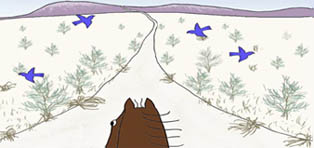PNTS.org - Full Article
February 28, 2017
We Hike the Hill
Over 100 individuals representing over 40 trail organizations from throughout the country traveled to Washington, D.C. this February to “Hike the Hill”. Now in its 20th year, Hike the Hill® is a joint effort between the Partnership for the National Trails System and the American Hiking Society aimed at increasing congressional and Federal agency leader awareness of funding and authorities needed to sustain the National Trails System (NTS).
During our week in D.C., we met with agency partners, congressional staff, and members of Congress to discuss the opportunities for and the threats facing our NTS.
Congressional Support
There are many pieces of legislation that aid or threaten our national trails. The year ahead will prove critical to our NTS. Some of main issues or pieces of legislation we discussed while in Washington are as follows:
• Land and Water Conservation Fund (LWCF) (HR 502):
This is one of the most well-known bi-partisan issues that relates to the NTS. The LWCF provides funding that allows for protection and completion of crucial sections of trails. Revenue from offshore drilling for oil and gas helps to fund various conservation projects with no cost to tax-payers. The LWCF is only authorized until September 30, 2018 and will expire then unless Congress re-authorizes the program. We believe, however, that LWCF should be permanently authorized and fully funded at $900 million annually. There is currently a bill (HR 502) in support of the LWCF in the house, but no similar bill in the Senate.
• Wildfire Disaster Funding:
We believe that the federal government should budget for the suppression of wildfire disasters by treating wildfires like other U.S. disasters such as floods, hurricanes, tornadoes, etc. Currently, more than 50% of the US Forest Service budget is being spent to fight unprecedented wildfires. This takes money away from other important functions such as maintaining national forests and trails.
• Federal Land Transaction Facilitation Act (FLTFA)
This bi-partisan act would restore the authority to facilitate the sale of unneeded federal land by the Bureau of Land Management in order to provide funding to purchase high-priority land for conservation and outdoor recreation.
• BLM 2.0
BLM Planning 2.0 makes land use planning more accessible to the public, more responsive to the changing conditions on public lands, and more efficient. Despite its benefits, Congressional Review Act (CRA) resolutions were introduced in both the House of Representatives and the Senate to prohibit its use moving forward.
• North Country National Scenic Trail Route Adjustment
These bipartisan bills authorize the relocation of the North Country National Scenic Trail along the north shore of Lake Superior and across the Arrowhead of Minnesota to rejoin the existing trail in the Chippewa National Forest. They also authorize extending the trail from the New York-Vermont border to connect with the Long Trail and Appalachian National Scenic Trail in Vermont. These bills repeat bills introduced, but not passed, in the previous Congress.
• National Scenic Trails Parity Act
We expect bills to be introduced that repeat bills introduced, but not passed, in the previous Congress to designate the Ice Age, New England, and North Country National Scenic Trails as units of the National Park System. The other three national scenic trails—Appalachian, Natchez Trace, and Potomac Heritage Trails—administered by the National Park Service (NPS) are units of the National Park System. These bills would instruct the NPS to treat all six of these trails the same within the structure of the National Park System.
Increased Funding
Furthermore, we believe that greater federal funding for the National Park Service, Bureau of Land Management, and USDA Forest Service’s trails programs will help leverage our ability to care for, connect, and protect our NTS.
In 2016 alone, for every federal dollar provided the return on investment equaled 1.5:1—thanks to volunteer stewardship of the trails. In total, over 1,000,000 hours of volunteer service were documented within the NTS, which equates to a value of over $24,256,000.
Additionally, private contributions from the national trails organizations for the NTS totaled over $13,184,000. However, as incredible as these contributions are, they are not enough to fully develop and sustain our trails. Full funding of the LWCF and greater funding for the agencies’ trail programs by Congress will help to provide means to close missing links, protect high-priority recreational and historic areas, and fund additional maintenance and necessary resources to already existing trails...
Read more here:
http://pnts.org/new/hike-the-hill-2017/

No comments:
Post a Comment